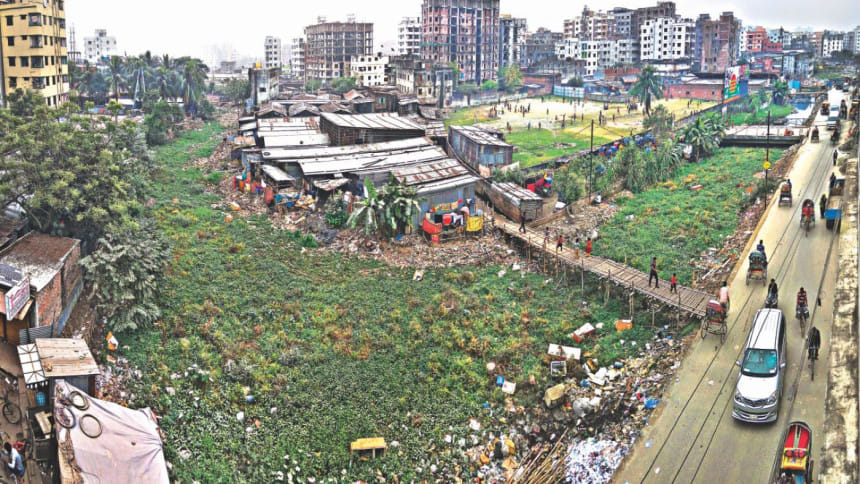Paying for own land!

They were once government land. But over the years powerful people occupied them and built establishments on them as they liked. Now the government wants to reclaim them with taxpayers' money.
With most of the surviving 26 city canals under illegal occupation and clogged with solid wastes, the government has taken up a Tk 607-cr project for land acquisition and excavation of five canals to ease the capital's waterlogging problem.
The five canals are Hazaribagh, Baishteki, Sangbadaik Colony, Begunbari and Manda Khal flowing through the two Dhaka city corporations.
Over 82 percent of the money will be spent on acquisition of 30.5 acres of “private land” and the rest on compensation for structures, excavation and bank development.
Excavation of a new canal, named Kurmitola, on 4.5-acre private land in the up and down stream of Hazaribagh Khal is also under the scheme. The Kurmitola canal will drain out the rainwater of Hazrat Shahjalal International Airport and the old airport in Tejgaon.
The Executive Committee of the National Economic Council (Ecnec) approved the draft proposal yesterday. Prime Minister Sheikh Hasina chaired the meeting.
The local government ministry proposed the two-year scheme to be implemented by Dhaka Wasa by December next year.
Asked about the justification for land acquisition to recover the canals, Wasa Managing Director Taqsem A Khan said parts of the canals were on government land. But they need to acquire some private land for the continuation of the canals.
He declined to comment on their plan to reclaim the canals from grabbers.
An official present at yesterday's Ecnec meeting said the PM questioned the need for land acquisition given the canals are on public land.
In reply, a ministry official said they only made a proposal and that they would not spend the money if not required.
After the meeting, Planning Minister AHM Mustafa Kamal told reporters that the PM asked the authorities to demolish all structures to reclaim the canals.
Project documents show the local government ministry argued for land acquisition, saying it was necessary for widening of the existing canals and excavation of a new one.
The storm drainage system in the city is largely dependent on the five canals and their excavation will help ease the city's perennial waterlogging problem, it said.
The planning commission recommended approving the project.
Urban planners say an inadequate drainage system managed by seven authorities with little coordination and reckless destruction of wetlands and flood flow areas are the key reasons for Dhaka's waterlogging.
They repeatedly warned against the continued destruction of the flood plains and wetland for “mindless commercial gains”.
The city's natural drainage system -- comprised of a network of 65 canals and four rivers, numerous water retention areas (ponds, ditches), extensive low-lying areas and flood flow zones -- has been consistently destroyed in the name of development, they said.
Canals, rivers and water retention areas collect, carry and retain rainwater and are connected to each other as a drainage network.
The low-lying wetlands and flood flow zones earmarked in the Detailed Area Plan (DAP) of Dhaka city no longer exist as those have been filled up, in many cases with government's approval, resulting in severe urban waterlogging.

 For all latest news, follow The Daily Star's Google News channel.
For all latest news, follow The Daily Star's Google News channel. 








Comments